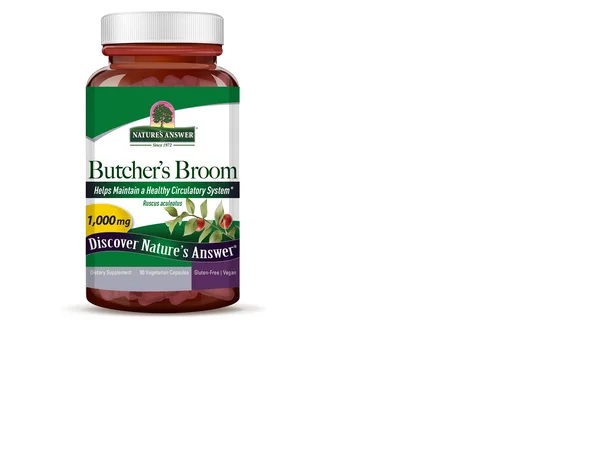Butcher’s broom, scientifically known as Ruscus aculeatus, is a perennial shrub native to Europe, North Africa, and Western Asia. Esteemed for its historical uses in traditional medicine, butcher’s broom has gained recognition for its potential health benefits in modern times. In this comprehensive guide, we’ll explore the origins, nutritional composition, therapeutic uses, dosage recommendations, and safety considerations associated with butcher’s broom supplements.
Understanding Butcher’s Broom
Origins and Traditional Use
Butcher’s broom has a longstanding history of use in traditional medicine systems, dating back centuries. Ancient civilizations, including the Greeks and Romans, valued butcher’s broom for its medicinal properties. The plant derived its common name from its historical use by butchers, who used the stiff twigs to clean their cutting boards. In traditional herbal medicine, butcher’s broom was prized for its diuretic, anti-inflammatory, and venotonic properties.
Nutritional Composition
Butcher’s broom contains a variety of bioactive compounds, including saponins (such as ruscogenins), flavonoids, sterols, and tannins. These phytochemicals contribute to butcher’s broom’s therapeutic effects and potential health benefits. Additionally, butcher’s broom is rich in nutrients such as vitamin C, potassium, and magnesium, which enhance its nutritional profile. Its nutritional composition makes butcher’s broom a valuable botanical supplement for supporting various aspects of health and well-being.
Health Benefits of Butcher’s Broom Supplements
Venous Health
Butcher’s broom is renowned for its venotonic properties, which support the health and function of the venous system. The plant’s saponin compounds, particularly ruscogenins, help strengthen the walls of blood vessels and improve venous tone. Butcher’s broom supplements may help alleviate symptoms of chronic venous insufficiency (CVI), such as varicose veins, spider veins, and leg swelling. Additionally, butcher’s broom may aid in reducing the discomfort associated with hemorrhoids.
Circulatory Support
Butcher’s broom supplements have been shown to promote healthy circulation by improving blood flow and reducing blood viscosity. The plant’s vasoconstrictive properties help constrict blood vessels, enhancing circulation and preventing the pooling of blood in the lower extremities. By supporting optimal blood flow, butcher’s broom may help alleviate symptoms of conditions such as Raynaud’s disease and peripheral artery disease (PAD).
Anti-inflammatory Effects
Butcher’s broom exhibits potent anti-inflammatory properties, which can help reduce inflammation and alleviate pain associated with various conditions. The plant’s saponin compounds have been shown to inhibit inflammatory pathways and reduce the production of inflammatory mediators in the body. Butcher’s broom supplements may be beneficial for individuals experiencing joint pain, arthritis, or inflammatory skin conditions.
Diuretic Action
Butcher’s broom supplements possess mild diuretic properties, which help promote urine production and eliminate excess fluids from the body. By increasing urinary output, butcher’s broom may help reduce fluid retention and alleviate symptoms of edema (fluid buildup) in conditions such as heart failure and kidney disease. Additionally, butcher’s broom’s diuretic action may support kidney health and function.
Digestive Health
Traditionally, butcher’s broom has been used to support digestive health and alleviate gastrointestinal discomfort. The plant’s anti-inflammatory and anti-spasmodic properties help soothe irritated mucous membranes in the digestive tract and reduce gastrointestinal spasms. Butcher’s broom supplements may aid in relieving symptoms of conditions such as irritable bowel syndrome (IBS), bloating, and indigestion.
Dosage Recommendations
Standardized Extracts
Butcher’s broom supplements are available in various forms, including capsules, tablets, tinctures, and teas. Dosage recommendations may vary depending on the concentration of active compounds and the specific health condition being targeted. However, a typical dosage range for butcher’s broom extract is 100-300 milligrams per day. It is advisable to follow the dosage instructions provided on the product label or consult with a healthcare professional for personalized recommendations.
Safety Considerations
Generally Recognized as Safe
Butcher’s broom supplements are generally considered safe for most individuals when taken at recommended doses. However, some people may experience mild side effects, including gastrointestinal upset or allergic reactions. It is essential to start with a low dose and monitor for any adverse reactions. Pregnant or breastfeeding women should consult with a healthcare professional before using butcher’s broom supplements.
Drug Interactions
Butcher’s broom supplements may interact with certain medications, including blood thinners, antihypertensive drugs, and diuretics. Individuals taking these medications should exercise caution and consult with a healthcare professional before using butcher’s broom supplements to avoid potential interactions.
Conclusion
Butcher’s broom supplements offer a range of potential health benefits, including venous support, circulatory support, anti-inflammatory effects, diuretic action, and digestive health. With its rich history and therapeutic properties, butcher’s broom continues to be valued as a versatile botanical supplement. By incorporating butcher’s broom supplements into a balanced lifestyle, individuals can harness its medicinal properties to support overall health and well-being. As with any supplement

